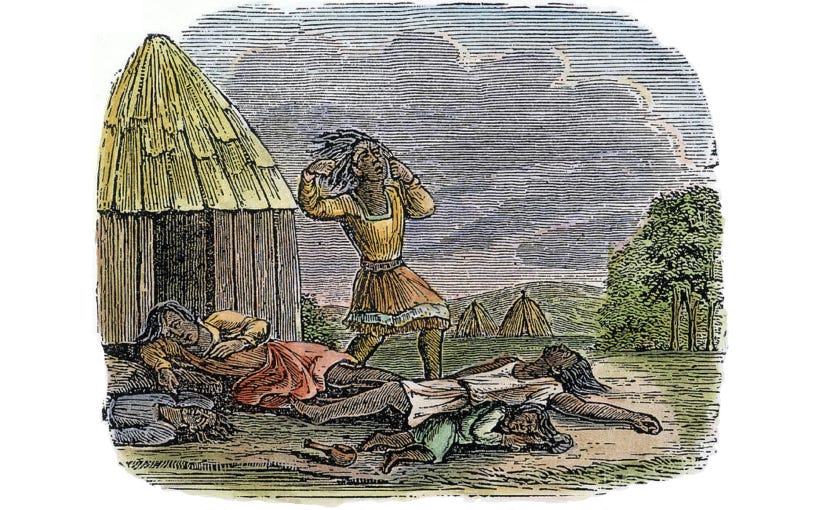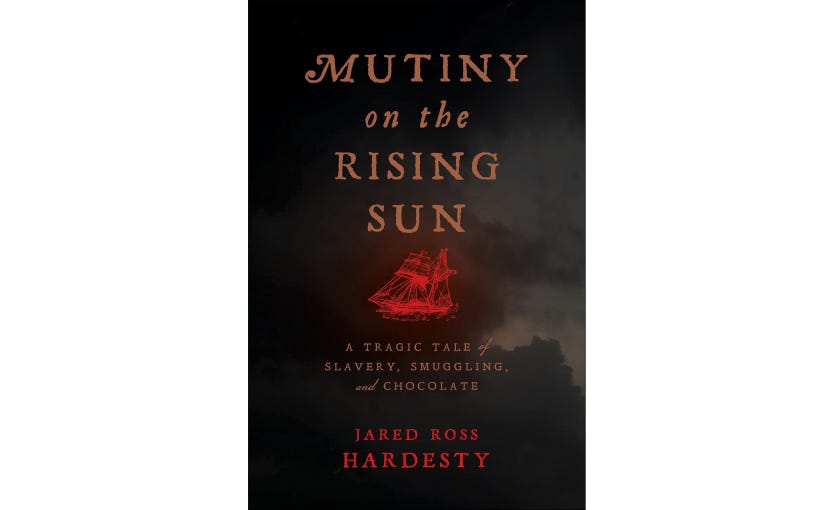Please favorite this email or bookmark this page. (And maybe FORWARD this email or recommend this page on social channels?)
Happy holidays, subscribers and Eleven Names readers!
It’s Christmas break, and I’m taking a gamble. I’m betting that you’d rather listen to podcasts this week than read a thousand-word newsletter. If I’m wrong, check out the back catalog at eleven-names.com and the Open Notebook archive.
But if I’m right, I’ve compiled nine episodes of HUB History that have influenced and augmented my work. On the one hand, I don’t expect you to drop everything and listen right now, hence the request to favorite/bookmark. On the other, maybe you could use some fresh air or you need to walk your dog. Perhaps a new podcast would encourage you to stretch your legs?
Either way, through HUB History, Jake and emerita host Nikki offer tremendous value to the local public and digital history landscapes. So please take this edition of ENP: Open Notebook as my personal recommendation of the HUB History podcast.
Nota bene: there are 263 episodes of HUB History covering everything from true crime, Nike missiles, Confederate POWs, the Vilna Shul, mysterious Harvard professors, and yes, the enslavement and captivity of Indian and African people in Boston.
Drop your favorite episodes in the comments if you're already a fan. Or use the comments to ask for episode suggestions; just let me know what you’re looking for. And be sure to dive into the always excellent show notes.
Next week’s newsletter is drafted. Subscribe now if you want to read about gender nonconformity and two enslaved people in Massachusetts with original illustrations!
- Wayne
Burned at the Stake! (episode 27)
Despite what a lot of people think, the victims of the Salem witch trials were hanged, not burned at the stake. However, in the history of Massachusetts, two women were executed by burning them at the stake, one in 1681 and another in 1755. If witchcraft was a crime against both the state and God, what crime could be worse in Puritan Boston? A note about the content this week. We frankly describe acts of brutal violence, and we at times use the racial language of our 17th and 18th-century sources. If you usually listen with children, you might want to listen to this episode alone first and decide if it’s appropriate for them.
http://www.hubhistory.com/episodes/episode-27-burned-stake/
Harvard Indian College, Promises Broken… and Kept, (episode 64)
There’s an oft forgotten clause written into Harvard’s 1650 charter promising to educate the Native American youth of Massachusetts. This week’s episode looks at the early, mostly unsuccessful efforts to create an Indian College on the Harvard campus, the abandonment of that plan after King Philip’s War soured the English settlers on their earlier plans for Christianizing local Native American tribes, and how modern scholarship is helping to rediscover this legacy and rededicate Harvard to embracing Native Americans.
http://www.hubhistory.com/episodes/episode-64-harvard-indian-college-promises-broken-kept/
Original Sin: The Roots of Slavery in Boston (Episode 74)
The Boston slave trade began when a ship arrived in the harbor in the summer of 1638 carrying a cargo of enslaved Africans, but there was already a history of slave ownership in the new colony. After this early experience, Massachusetts would continue to be a slave owning colony for almost 150 years. In this week’s episode, we discuss the origins of African slavery in Massachusetts and compare the experience of enslaved Africans to other forms of unfree labor in Boston, such as enslaved Native Americans, Scottish prisoners of war, and indentured servants. Warning: This week’s episode uses some of the racialized language of our 17th and 18th century sources, and it describes an act of sexual violence.
http://www.hubhistory.com/episodes/original-sin-the-roots-of-slavery-in-boston-ep74/
Apocalypse on Boston Bay (episode 119)
In the years immediately before English Puritans settled on the Shawmut Peninsula, a series of epidemics nearly wiped out the indigenous population of New England. The worst of these plagues was centered on Boston Harbor, and swept from Narragansett Bay in the south to the Penobscot River in the North. It was the greatest tragedy to befall Native peoples of the region, who sometimes referred to it as “the Great Dying,” while English settlers called it a “wonderful plague” or a “prodigious pestilence.” They believed the disease had been sent by God to purge the native inhabitants of the continent and make way for his chosen people.
http://www.hubhistory.com/episodes/apocalypse-on-boston-bay-episode-119/
Pamphlets, Statues, and the Selling of Joseph (episode 191)
In June 1700, a brief pamphlet titled The Selling of Joseph was published in Boston. It’s considered the first abolitionist tract to be published in what’s now the United States. Authored by Salem witch trial judge Samuel Sewall, the three-page pamphlet uses biblical references to argue that enslaving another person could never be considered moral. Listen to find out what motivated Sewall to write the tract, how his peers in Boston reacted to it, and what its effect was on the wider world. In light of recent events, we’ll also consider the current debate around statues and their removal.
http://www.hubhistory.com/episodes/pamphlets-statues-and-the-selling-of-joseph-episode-191/
He Takes Faces at the Lowest Rates (episode 229)
In 1773, an ad appeared in the Boston Gazette for a Black artist who was described as possessing an “extraordinary genius” for painting portraits. From this brief mention, we will explore the life of a gifted visual artist who was enslaved in Boston, his friendship with Phillis Wheatley, the enslaved poet, and the mental gymnastics that were required on the part of white enslavers to justify owning people like property. Through the life of a second gifted painter, we’ll find out how the coming of the American Revolution changed life for some enslaved African Americans in Boston. And through the unanswered questions about the lives of both these men, we’ll examine the limits of what historical sources can tell us about any given enslaved individual.
http://www.hubhistory.com/episodes/he-takes-faces-at-the-lowest-rates-episode-229/
Mutiny on the Rising Sun, with Dr. Jared Ross Hardesty (episode 234)
This week, Jake interviews Dr. Jared Ross Hardesty, author of the new book Mutiny on the Rising Sun: a tragic tale of smuggling, slavery, and chocolate, which uncovers the dark web of interconnections between Old North Church, chocolate, and chattel slavery. Dr. Hardesty will explain why a reputable sea captain would become a smuggler, trafficking in illegal chocolate and enslaved Africans; the risks an 18th century Bostonian would take to provide himself with a competence, or enough money to allow his family to live independently; and what it meant in that era to be of but not from Boston. At the heart of the story is a brutal murder and mutiny on the high seas, illustrating the fundamental brutality of life in the 18th century, but the role of the church (specifically Old North Church) in the social and economic lives of Bostonians is also central to understanding the life and death of Captain Newark Jackson.
http://www.hubhistory.com/episodes/mutiny-on-the-rising-sun-with-dr-jared-ross-hardesty-episode-234/
BONUS EPISODES: David Walker’s Radical Appeal (episode 117) and Black Radical: The Life and Times of William Monroe Trotter, with Kerri Greenidge (episode183)
The general scope of the Eleven Names Project focuses on people enslaved in Massachusetts pre-1783, but I think the stories of David Walker and William Monroe Trotter are too important not to include in this lineup.
David Walker was one of America’s first radical abolitionists, a free African American man who moved to Boston in 1824 to escape the danger and humiliations of life in the slave states. He became a prominent member of Black society in Boston before writing and distributing An Appeal to the Colored People of the World. This radical work called for the immediate abolition of slavery, and even advocated violence against whites to bring about emancipation. At the time, few white leaders were talking openly about ending slavery, and those who were favored gradual emancipation. Frederick Douglass would later say that the book “startled the land like a trump of coming judgement,” and it shook the slaveowning society of the white South to the core.
http://www.hubhistory.com/episodes/david-walkers-radical-appeal-episode-117/
From his Harvard graduation in 1895 to his death in 1934, William Monroe Trotter was one of the most influential and uncompromising advocates for the rights of Black Americans. He was a leader who had the vision to co-found groups like the Niagara Movement and the NAACP, but he also had an ego that prevented him from working effectively within the movements he started. He was a critic of Booker T. Washington, and an early ally of Marcus Garvey. Monroe Trotter was the publisher of the influential Black newspaper the Boston Guardian, and he is the subject of a new biography by Tufts Professor Kerri Greenidge called Black Radical: The Life and Times of William Monroe Trotter.








